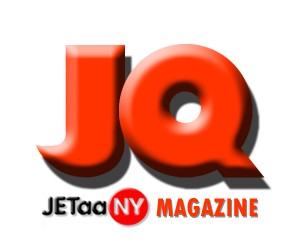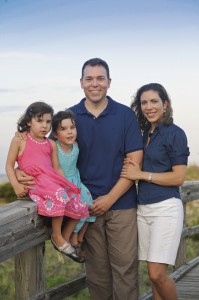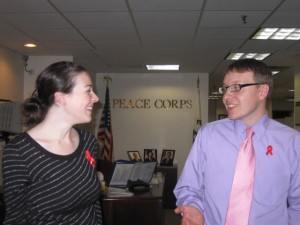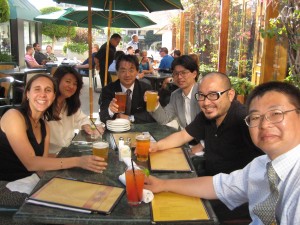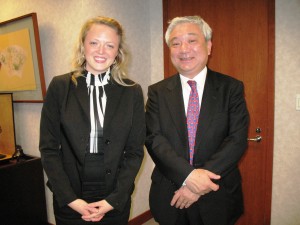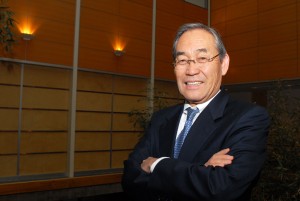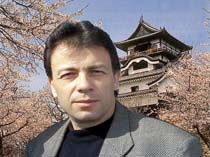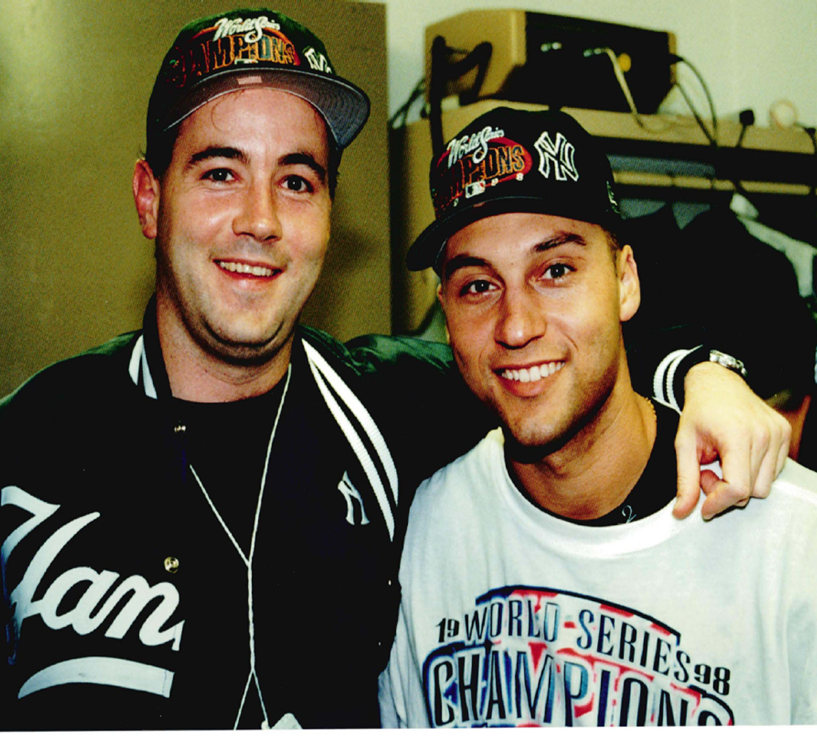JQ Magazine’s July/August “Hot Button Issue” Out Now!
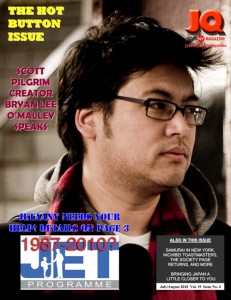 JQ knows you’re going to see Scott Pilgrim vs. the World, the summer’s coolest comic book movie, so why not get to know the the guy who started it all, cartoonist Bryan Lee O’Malley? Their new “Hot Button” issue features an exclusive interview with Bryan, a recap of the new Samurai in New York museum exhibition, and the return of the JETAANY Society Page, plus more! Click here to view.
JQ knows you’re going to see Scott Pilgrim vs. the World, the summer’s coolest comic book movie, so why not get to know the the guy who started it all, cartoonist Bryan Lee O’Malley? Their new “Hot Button” issue features an exclusive interview with Bryan, a recap of the new Samurai in New York museum exhibition, and the return of the JETAANY Society Page, plus more! Click here to view.
Additional contents below. Thanks to JQ Editor Justin Tedaldi (Kobe-shi CIR, 2001-02) for another sugoi issue. Contact Justin if you’d like to pitch or write a story for the next issue.
CONTENTS
- Page 3……..From the Editor, Japan Local Government Center Executive Director
- Page 4……..Nippon News Blotter / Welcome Suzuki-san
- Page 5……..JETAANY Society Page by Goshippu Garu
- Page 6……..JETlog featuring Byron Nagy
- Page 6……..Samurai in New York Exhibition by Mark Brandstetter
- Page 7……..Bryan Lee O’Malley: The JQ Interview by Justin Tedaldi
- Page 8……..Nihonjin in New York featuring Noriko Hino by Stacy Smith
- Page 9……..Book Corner: Nintendo Magic by David Kowalsky
- Page 10……Nichibei Toastmasters by Pam Kavalam
- Page 11……The Funny Page
- Page 11……The Heiz Rocks On by Hugh Prysten
WIT Life #109: Parade
WITLife is a periodic series written by professional Writer/Interpreter/Translator Stacy Smith (Kumamoto-ken CIR, 2000-03). She starts her day by watching Fujisankei’s newscast in Japanese, and here she shares some of the interesting tidbits and trends together with her own observations.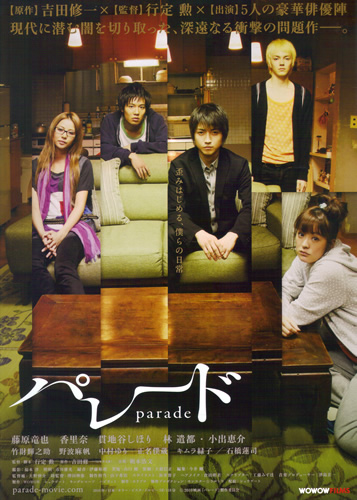
At Japan Society on Friday night I saw what has been my favorite movie of the Japan Cuts festival so far, Parade. A special treat was the attendance of the director, Isao Yukisada, to introduce the movie and take questions after. He presented the movie as a “slice of the dark side of Tokyo,” and expressed his nervousness and excitement at having his work screened here in New York for the first time. The movie explores the relationships between four young people sharing an apartment in Tokyo, as they deal with their respective troubles as well as the danger of an assailant who has been attacking women in the area. The title refers to Read More
Job: Public Outreach Officer, Polaris Project Japan (Tokyo)
Job posting by Lauren Sethney (Niigata-shi CIR, 2000-2003). Lauren serves as the Program Director at the Japan-America Society in Dallas-Fort Worth.
via Marc Hitzig (Niigata-ken, 1992-1995)
Polaris Project is an internationally recognized organization headquartered in the United States that has been working to combat human trafficking and modern-day slavery since 2002. Polaris Project has operated a local office in Japan since 2004. Polaris Project Japan (PPJ) seeks a Program Officer, who will be responsible for a variety of roles in a small office. The Program Officer will work under the direction of the Japan Program Coordinator. The position will be based in the Tokyo, Japan office. The position’s continuance is subject to extended funding, secured currently for one-year.
The Program Officer will:
–Support all general programmatic activities including: victim outreach and identification, victim services, policy advocacy, prevention and youth empowerment, coalition and infrastructure- building, office administration, training and technical assistance, fundraising, strategic planning, leadership development, and grassroots community mobilization.
–Support the general administration of the PPJ Office, including a primary role in the training and coordination of volunteers and training materials development, office management, maintenance of timesheets, Salesforce data management, and response to general office inquiries.
–Play a leading role in public communications, including fashioning a public affairs strategy, managing communications materials, social networking efforts, awareness newsletters, and the PPJ website; and importantly helping to produce a quarterly analysis of trafficking trends in Japan.
–Play a leading role in fundraising, including donor development and relationship management; fundraising events and campaign management; pursuit, and management of grants.
–Play a leading role in legislative advocacy and PPJ’s role in the anti-human trafficking coalition, including interaction with the legislative and executive branch of the Japanese government and the dissemination of trafficking trends analysis to all relevant stakeholders.
Qualifications:
–At least three to five years of experience, preferably in the non-profit sector
–Minimum three years of professional experience working in Japan
–Knowledge of government agencies in Japan
–Excellent organizational, written, and oral communication skills in Japanese
–Strong command of both Japanese and English languages
–Experience, competence, and confidence in supervising volunteers
–Experience working in multicultural environments
–Ability to set and balance multiple priorities, plan ahead, and anticipate programmatic needs
–Solutions-oriented, collaborative, self-directed, and self-disciplined
–Resiliently positive and energetic attitude
–Focus on and commitment to human and women’s rights and interest in fighting human trafficking
Degree Preferred: MA; BA required
Type: Full Time
Salary: $30,000 to $35,000 (DOE)
Start Date: Available immediately
Languages Required: English, Japanese
How to Apply:
PLEASE DO NOT FAX OR MAIL YOUR APPLICATION. All application materials should be sent electronically as attachments to Applications@ polarisproject. org. Materials should include a custom cover letter, resume, and three references, plus any additional personal statements you may wish to include. The deadline for application is rolling, until a candidate is chosen, so early application is advised. Please write JAPAN Program Officer Position in the subject line of the email.
JET ROI: Top Ten “Best of JQ” Articles That Support Our Cause
Wondering how JET alums give back to the community and make new connections with Japan after their work on the program is over? JQ Magazine Editor Justin Tedaldi (Kobe-shi CIR, 2001-02) has compiled a list of ten relevant articles from the past two years that exemplify the dedication of our members.
2010 May/June – Bruce Feiler interview (an author who’s probably the biggest “JET celebrity” out there. Wrote his first book about his JET experiences) by Justin Tedaldi
2010 January/February – Aaron Woolfolk interview (JET alum, first African American to direct a feature film in Japan) by Lyle Sylvander
2010 January/February – Peace Corps profile (talks with those who joined Peace Corps after the positive experience they had on JET) by Marea Pariser
2009 Fall – International Visitor Leadership Program interpreting (shows how JETs can become invaluable interpreters to continue grassroots internationalization at home) by Stacy Smith
2008 Summer – Ambassador Nishimiya interview (boosts visibility of new Japanese officials to our readers; demonstrates strong relationships between JETAA chapters and local government) by Anne Koller
2009 Spring – Hikaru Utada interview (probably the longest English-language interview with Utada out there. It was even translated into Japanese by a resourceful fan) by Justin Tedaldi
2009 Spring – JETAANY Author Showcase (names four notable JET alum authors and also stands as a unique event organized by JETAANY) by Gina Anderson and Justin Tedaldi
2009 Spring – President Sakurai of Japan Society interview (this piece examines JET’s relationship with non-profit cultural centers and is included in Japan Society media kits) by Justin Tedaldi
2008 Fall – Anthony Bianchi interview (JET done good in Japan) by Michael Glazer
2008 Summer – George Rose interview (JET done good at home) by Stacy Smith
Comments are welcome. Spread the word!
By Justin Tedaldi, Editor (Kobe-shi CIR, 2001-02) for JQ Magazine. Portions of this interview were originally published on Examiner.com.
Award-winning bestselling author, journalist, and—in his own words—“professional traveler” Bruce Feiler (Tochigi-ken, 1987-88) has been a writing books for nearly 20 years, the most recent of which focused on social issues and religion. Bruce’s new book, The Council of Dads: My Daughters, My Illness, and the Men Who Could Be Me, was inspired by his diagnosis with cancer two years ago. Faced with an uncertain future and concerned about his family, he asked six of his peers to form a “Council of Dads” to help guide his young daughters through their lives. JQ spoke with Feiler about the start of his writing career, which began with 1991’s Learning to Bow, an account of his time living in Japan as an English teacher on the inaugural year of the JET Program, as well as his thoughts about the program today.
You’re now cancer-free. When did you receive this prognosis, and what was your treatment like?
I was first diagnosed in July 2008, and I had osteosarcoma, which is so rare that only one hundred adults a year get it. Twenty years ago they would have cut off my leg and hoped, since there was a fifteen percent survival rate. They determined that one cocktail of chemo could be effective, and I had that. I basically had four months of chemo, a 15-hour surgery to rebuild my leg, and then four more months of chemo. So, I’ve technically been cancer-free since my surgery when they cut the tumor out of my femur. I’ve been cancer-free now for about 15 months. I’m full of hope walking forward.
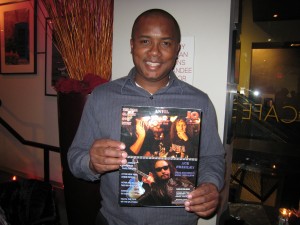
JET Filmmaker/JQ subscriber Aaron Woolfolk at the New York premiere of his film ‘The Harimaya Bridge,’ December 2009
By Lyle Sylvander (Yokohama-shi, 2001-02) for JQ Magazine
Most JETs enjoy telling tales about the cities they lived in. But it’s a select few who take the extra step of making movies that actually take place in them. JETAA Southern California’s Aaron Woolfolk (Kochi-ken, 1992-93) is the writer and director of The Harimaya Bridge, which received a theatrical release in Japan last year and premiered in New York’s Upper West Side in December as part of the African Disapora Film Festival.
The film stars Ben Guillory as Daniel, an American man who travels from San Francisco to Kochi after his estranged son—who works as an assistant English teacher—Mickey (Victor Grant) dies in a traffic accident. There, Daniel’s own prejudices spark rows with his Japanese hosts and daughter-in-law Noriko (Saki Takaoka) as he discovers secrets his son left behind. The film will receive a wider release in the U.S. for spring 2010, and JQ talked with Aaron about the making of the film.
How did you get involved with JET?
During my senior year in college, I ran into a couple of friends who were on their way to pick up an application for the JET Program. I had nothing to do when I saw them, so I tagged along. I had never heard of the program before, but it definitely intrigued me. I had always wanted to experience another culture firsthand, and thought the best way to do that would be to live in that culture, rather than merely visiting it for a limited time.
By Marea Pariser (Kagoshima-ken, 2003-04) for JQ Magazine
What comes to mind when you think of the Peace Corps? Is it the image of young, daring humanitarians performing HIV/AIDS work across Africa? Or how about the ambitious environmentalist who flocks to third-world Latin America to build aqueducts in the locals’ backyards? Sure, we all know the stereotype—adventurous, somewhat-experienced travelers willing to spend two years out in the bush roughing it with the locals as a result of their passion to see the world and underlying desire to help others.
Perhaps we’ve thought about the opportunity for ourselves. And it’s likely that we all know at least one person who’s a current or returned Peace Corps volunteer. What probably doesn’t come to mind, though, regarding this nearly 50-year-old program—founded in 1961 by the Kennedy administration—is the image of native English speakers flying abroad to teach English as a second language to locals in over 70 countries where the Peace Corps has presence.
Sound familiar? It should.
By Stacy Smith (Kumamoto-ken CIR, 2002-03) for JQ Magazine
Since becoming a freelance Japanese translator/interpreter/writer, one of the opportunities that I have enjoyed the most has been interpreting for the Department of State’s International Visitor Leadership Program (IVLP). IVLP is an exchange program designed to build mutual understanding between the U.S. and other countries through carefully designed visits that reflect the participants’ (the titular IVs) professional interests and to support U.S. foreign policy goals. For IVs, it involves meeting professional counterparts and learning to appreciate America’s ethnic, cultural, political and socioeconomic diversity.
IVs are established or potential foreign opinion makers in government, public policy, media, education, labor, the arts and other key fields, and after being nominated by someone they are selected by American embassies abroad. Since the program’s inception in 1940, there have been over 140,000 participants (about 5,000 each year), including 290 current and former heads of government such as Tony Blair and several Japanese prime ministers.
However, here in the States all IVs are considered “honorary Americans.” This means that no matter what their rank is back home, during the program everyone is of equal status. This takes quite a bit of pressure off the lowly interpreter (who of course has hopes of being fondly remembered when her former participants go on to become big shots!).
Best of JQ: Ambassador Shinichi Nishimiya: Diplomat, Collaborator, Fly Fisher (Summer 2009)
By Anne Koller (Fukuoka-ken, 2002-2004) for JQ Magazine.
Having been spotted at various local Japan events, JETs were curious to know more about the new Consul General Shinichi Nishimiya. JQ talked with Ambassador Nishimiya to find out his plans for the consulate in New York and how JETAANY can help.
How are you and your family adapting to New York life? What has been the hardest part about living in the city and the most satisfying? What do you miss the most about our beloved Nippon?
We are adapting very well. The hardest part has been the weather. Nobody told us that NY weather is this unstable and unpredictable. [Jokingly] I have been told that there is no spring or fall between the long hot summer and a long, cold winter: then how do you describe what we have now? The most satisfying part of living in New York for my wife and I is meeting people. Everyone has been very welcoming and kind. I miss ramen! There are ramen shops everywhere in Japan and they are always open. You can go to places in New York, but it isn’t the same. I do think the lack of eating ramen has allowed me to live a healthier life here which my wife is certainly happy about [laughs].
Best of JQ: The Hikaru Utada Interview (Spring 2009)
 By Justin Tedaldi, Editor (Kobe-shi CIR, 2001-02) for JQ Magazine
By Justin Tedaldi, Editor (Kobe-shi CIR, 2001-02) for JQ Magazine
It was perfect timing. Back in January, Hikaru Utada, the New York-born recording phenomenon who before she was out of her teens notched three of Japan’s top ten bestselling albums (including Number One), was back in town working on a new album for the U.S., and JQ spent a full hour with Hikki to talk of many things, including her new disc This is the One, which hit stores in May.
I know you want to talk about the new album and the single.
The song…
I heard it about two and half weeks ago, as I think I was already on the e-mail list from when your last English album came out.
Oh, right, right, right.
So we go way back. Ten years ago I found out about First Love when I studying Japanese as an undergraduate…
Oh, wow.
It’s amazing to be here now talking about it.
I’m humbled [laughs]. Read More
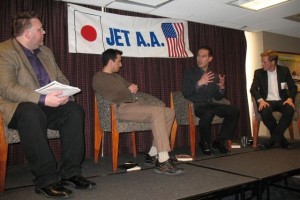
- From left: JET alum authors Randall David Cook, Robert Weston, Roland Kelts and James Kennedy talk shop at the Author Showcase in Midtown (photo by Noriko Furuhata)
By Gina Anderson (Nara-ken, 2003-05) and Justin Tedaldi, Editor (Kobe-shi CIR, 2001-02) for JQ Magazine. This article was previously published on JetWit and appeared in the Consulate General of Japan in New York and Japan Information Center’s Japan Info e-newsletter.
New York City’s Holiday Inn hosted a summit for published JETs as JETAA NY launched its debut JET Alumni Author Showcase on March 22. The panelists included pro writers Roland Kelts (Osaka-shi, 1998-99), Robert Weston (Nara-ken, 2002-04) and James Kennedy (Nara-ken, 2004-06).
Drawing over 60 JET alums, friends and family, the event kicked off with some words from Akira Sugiyama, director of the Japan Information Center of the Consulate General of Japan in New York. Moderator and playwright Randall David Cook (Fukui-ken, 1991-93), creator of the critically acclaimed Off Broadway plays Sake with the Haiku Geisha and Fate’s Imagination, asked each author to share a favorite selection of their works with the crowd.
By Justin Tedaldi, Editor (Kobe-shi CIR, 2001-02) for JQ Magazine
Even century-old organizations can find new ways to change. In April, New York’s Consul General of Japan Motoatsu Sakurai became the first Japanese president of the city’s esteemed Japan Society. JQ talked with President Sakurai (who has graciously hosted JET gatherings at his home numerous times over the years) shortly after his inauguration to ask about his new plans and ideas for the future.
How did become the new president of Japan Society? Did you campaign, or were you appointed directly by their board of directors?
I have long been an admirer of Japan Society, its mission and its programs. In fact, I served as member of Japan Society’s Board of Directors from 2003 until my appointment as Ambassador and Consul General of Japan in New York, after which I became an Honorary Director. Towards the end of my term as Ambassador, when former president Richard J. Wood was looking to retire, the Society’s board approached me to see if I had interest in the position. As my first venture into the nonprofit sector, leading this venerable 102-year old organization seemed like—and now is—an exciting new challenge.
By Michael Glazer (Chiba-ken, 1995-97) for the JETAANY Newsletter
Bensonhurst, Brooklyn native Anthony Bianchi (Aichi-ken, 1987-91), the first-ever North American to hold an elected position in Japan, is still going strong in his role as a city councilman in Inuyama-shi, Aichi-ken. Michael Glazer (Chiba-ken, 1995-97) recently did a recorded interview with Anthony to discuss the hot local topics, learn more about politics in Japan and get a sense of how things look across the pond.
You have a very interesting background. How does a JET program teacher become a city council member?
Well, I’ll try to make the story as short as possible. I studied filmmaking at New York University and I was interested in Kurasawa films and whatnot, and I was out in L.A. for a while. I came back to New York. I was working for New York City and I saw an ad in the paper about the Expo that was held in Gifu about 20 years ago. So I went over to Japan on a homestay program and decided it would be nice to try to live there for a year or so. I joined the JET program, stayed for a couple years, and decided I wanted to stay longer.
Best of JQ: Pride of the Yankees (Far East Edition) (Summer 2008)
By Stacy Smith (Kumamoto-ken CIR, 2002-03) for the JETAANY Newsletter
JET Alum George Rose (Fukushima-ken, 1989-91) has mingled with Japanese royalty, interpreted for two baseball superstars named Hideki (Irabu and Matsui) and currently heads Yankee operations in Japan. How did this New York native manage to accomplish all this in his post-JET life? The JETAANY Newsletter had a chance to talk with George about his past exploits and his present position. Here are some excerpts from Stacy, who is collaborating with George to lead Japanese tours during games at Yankee Stadium this summer.
What was your post-JET career path?
I was going for my MBA at Columbia when I had the opportunity to become the interpreter for the new Yankee Hideki Irabu, so I took a leave of absence and worked with him from ’98-’99. When he got traded, I resume my studies and after graduation worked on Wall Street. When Hideki Matsui came over, I did a bit of interpreting for him such as at his opening press conference. Because at the time I had my own business I wasn’t able to do this full-time, but I did help with the interview process for his interpreter. Then last year the Yankees asked if I was interested in helping out with the opening of their office in Tokyo, and I went over last summer. Read More
Current Hiroshima-ken JET Gail Cetnar Meadows, Editor of Hiroshima JET webzine the Wide Island View, shines a light on some of the upcoming events of Japan America Societies…
 Indiana State Fair “Bridges to Japan” exhibit — Starting this year, Indiana’s state fair will have a new international theme each year, and they’re starting by featuring Japan. The exhibit will introduce visitors to Japanese culture and showcase Indiana’s extensive connections to Japan. Visitors can enjoy Japanese cultural activities, performances, exhibits on daily life, Japanese food, and displays on the many economic, sister city, and educational partnerships between Indiana and Japan. Volunteers are being recruited!
Indiana State Fair “Bridges to Japan” exhibit — Starting this year, Indiana’s state fair will have a new international theme each year, and they’re starting by featuring Japan. The exhibit will introduce visitors to Japanese culture and showcase Indiana’s extensive connections to Japan. Visitors can enjoy Japanese cultural activities, performances, exhibits on daily life, Japanese food, and displays on the many economic, sister city, and educational partnerships between Indiana and Japan. Volunteers are being recruited!
- Date: Aug. 6 to 22
- Place: Indiana State Fairgrounds, on the corner of East 38th Street and Fall Creek Parkway in Indianapolis
- For more information, click here.
- Summer Film Series — The Summer Film Series sponsored by the Japan Society of Boston will feature screenings of nine major Japanese movies (most of them new or rarely screened in the Boston area). It’s a wonderful opportunity to see Japanese hit movies or classics by great Japanese directors. Plus: they’re free! You can also enjoy dinner (often featuring Japanese delicacies) before the movies. Pre-registration is required.
- Date: June 29 to Aug. 24
- Time: Most screenings are on Tuesdays starting at 7 p.m. There will be a special A-bomb Memorial Day screening on Friday, Aug. 6
- Place: Movies will be in the Rainbow Hall of Showa Boston Institute. Dinner is in Showa’s cafeteria.
- For more information, click here.
 Canoe Excursion: Historic Franfort Tour — Enjoy a guided canoe/kayak trip with JASK friends, designed for beginners. Children and families are welcome. Price is $30. Float along and breath the fresh air in the midst of beautiful Kentucky river country.
Canoe Excursion: Historic Franfort Tour — Enjoy a guided canoe/kayak trip with JASK friends, designed for beginners. Children and families are welcome. Price is $30. Float along and breath the fresh air in the midst of beautiful Kentucky river country.
- Date: July 17
- Time: 4 to 6 p.m.
- Place: Kentucky River View Park, Frankfort, Kentucky
- For more information, click here.
- Japanese Dialect Workshops — Impress your Japanese friends with your knowledge of four dialects from the northernmost to the southernmost regions of Japan. These special language workshops are geared for intermediate to advanced Japanese language learners. Each week, a different dialect will be taught by native Japanese speakers from the regions of Okinawa, Kansai, Kyushu and Hokkaido. To register, click here.
- Dates: Wednesdays, July 21, July 28, Aug. 4, Aug. 11
- Time: 6:30 p.m.
- Place: Japan-America Society of Dallas/Fort Worth, 11615 Forest Central Drive, Suite 206, Dallas
- For more information, click here.
Does your Japan America Society have an upcoming event that you’d like to share with JetWit readers? Email Gail Cetnar Meadows the info.

